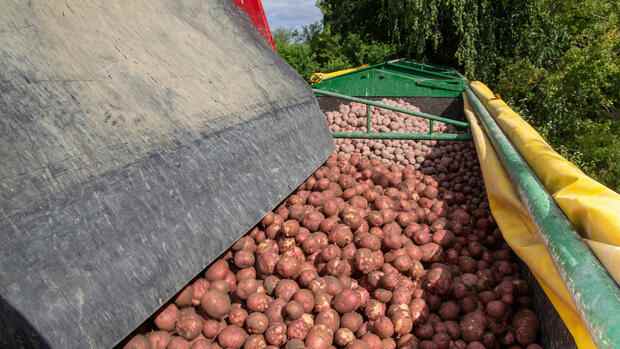Vienna Hungary’s Prime Minister Viktor Orban has again set a price cap in the country – this time for eggs and potatoes. Consumer prices for these foods will be frozen at the September 30 level, Chancellor Minister Gergely Gulyas announced recently.
Inflation in Hungary is higher than almost anywhere else in Europe. In October it was 21 percent. The rise in food prices is particularly high. This is 40 percent, and that hits a relatively poor country like Hungary particularly hard. A price brake has therefore been in force in Hungary for some foods such as sugar, cooking oil and chicken breast since February.
There are many reasons for the high prices. The war in Ukraine, for example, has pushed up energy and feed prices, and this price increase is affecting more and more consumer products. In Hungary, however, there was also a drought in the summer, which made animal feed even more expensive.
Orban prefers to use the upper price limit instrument to fight against escalating inflation. From an economic point of view, it is a dangerous measure because it slowly corrodes the markets.
Top jobs of the day
Find the best jobs now and
be notified by email.
Actually, Orban now knows exactly what distorting effects a price limit can have, because he has been trying to tame inflation with this instrument for about a year. In November 2021, for example, he already set an upper limit of 480 forints (1.15 euros) for petrol.
Gas cap distorts market
However, he did throw the market at the gas station out of balance – fuel was becoming scarce. Orban and his entourage have overlooked the fact that an artificially low price stimulates demand and leads to a shortage of supply.
In November 2021, an upper limit of 480 forints (1.15 euros) was already imposed on petrol.
(Photo: IMAGO/NurPhoto)
For example, there was an incentive for motorists from the neighboring countries of Austria and Slovakia to fill up in Hungary; at the same time, international oil companies are reducing their supplies to the country because business conditions are more attractive in other countries.
In the meantime, only private individuals, taxi drivers and agricultural machinery drivers are allowed to fill up at a preferential price, but not, for example, users of company cars. However, this sometimes results in private individuals buying petrol for 480 forints a liter and then reselling it for slightly less than the current market price of 697 forints (about 1.69 euros), they say.
The first effects of the price caps on the egg and potato markets are also already visible, although they have only been in place for about a week. Retailers have limited the amount of potatoes and eggs a single shopper can purchase.
Economists are already speculating that, like gasoline, these products could soon become even more scarce. That would cost the country dearly, because the weak forint has made imports much more expensive. Producers also have an incentive to sell their products abroad because they get a higher price there.
>> Read here: Cash upper limit – federal states disagree about the limit of 10,000 euros
Zsolt Becsey, the chief economist at the Equilibrium Institute think tank, says: “Poultry farmers, for example, could also ask themselves whether it still makes economic sense to produce eggs.” Especially since they not only suffered from the upper price limit, but also from the expensive and high feed Heating costs for the stables.
State budget is in bad shape
Orban is apparently not deterred by such imponderables. Financially, Hungary is only able to make compensation payments to the population to a limited extent. Economist and journalist Zoltan Farkas said: “The state budget is in too bad shape for that.”
In November 2021, for example, he already set an upper limit of 480 forints (1.15 euros) for petrol.
(Photo: dpa)
Bank economists estimate that Hungary’s budget deficit will amount to five percent of economic output (GDP) this year. The state subsidizes energy consumption in part. However, a financial “double boom” on the scale that Germany is planning with regard to energy costs is not possible.
>> Read here: The current developments in the Ukraine war in the Newsblog
Instead, Orban is holding producers and retailers accountable for fighting inflation. Orban has repeatedly imposed burdens on trade in particular, which is largely foreign-owned.
Companies like Lidl, Tesco, Spar and Auchan already pay a special tax because they are said to be making excess profits as a result of inflation. However, Orban is accepting that the country is increasingly heading towards a scarcity economy. He knows that from before 1989, says an economist.
More: Why is Viktor Orban so critical of sanctions against Russia? One answer lies behind Hungary’s border with Ukraine.
